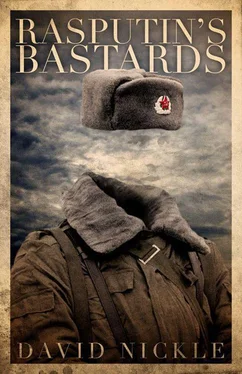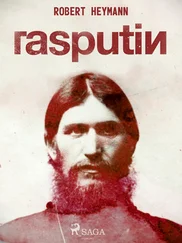Babushka died too soon, she thought, and let a hint of sadness creep into her.
But she quickly disciplined herself. Babushka had died. Her stories ought to be finished.
Grimly, Darya set off for the store.
The only narrative that she would inhabit would be the one that she had made for herself today. The one with the man from Russia.
She moved more quickly once she made it past Harbour Street. There were only pockets of people here — heads upturned, swaying back and forth. She elbowed between a thin balding man and a woman with flowing mascara who seemed to be in her sixties. Her shop was in sight.
She fished in her skirts for the key, and rushed up to the door to turn the lock. Her man had made it to the store — she was sure of it. The first place they’d met. In New Pokrovskoye. There was no Empire here and it was summer and —
She opened the lock and stepped inside.
“Hello, my child.”
She frowned. The voice was coming from everywhere.
“Who is it?”
“You should have to ask. Tell me — why are you not dancing?”
“What?”
“Why are you not dancing?”
She froze, and whispered:
“Koldun?”
The Koldun stepped out from behind a rack of liquor. He was carrying something in his hand.
“Everyone dances,” he said. “That is why we went to such trouble — to create a world for you, one you might all share. A world of treasure and gold and magic.”
“P-programming,” said Darya. Her hands scurried across the counter behind her — seeking some kind of a weapon. “There’s no world.”
The Koldun shrugged. “All right,” he said. “Programming then. And you, little Darya, have managed to figure a way around the programming.”
He looked at her more closely. “But you’re not that clever.”
He sniffed the air. “Kilodovich,” he said. “Alexei Kilodovich has touched you.”
Darya backed away. The Koldun moved closer.
“What a thing he is, this thing our Babushka has found. The power to free a girl. Hah. Where is he now? He cannot be far.”
“I — I don’t know who Alexei Kilodovich is,” said Darya — although she thought she might know who the Koldun was talking about. She felt a sliver of fear through her — and suddenly, she wanted nothing more than to return to the Empire — to the beautiful dream her beloved Babushka had crafted in her, with stories and the museum and a lifetime of programming.
The Koldun smiled sadly and shook his head. He raised the thing in his hand — Darya’s eyes widened as she recognized it for what it was.
“You can never go back, my little puppet,” he said softly, aiming the machine pistol at her middle. “Babushka would know everything then.”
There was a great oppressive darkness all around him and everywhere. Alexei Kilodovich screamed into it.
He screamed a lot of things. He screamed his rage at Babushka — at Holden Gibson — at Vladimir. He struggled too — trying to move and tear a hole for himself in this dark place where he’d fallen There was nothing to tear, though. For a long time — days or weeks or hours or minutes — Alexei grasped at unyielding dark — at absence. Then, for a time, he could hear things: music — laughter — dance.
Dance.
Was this the thing that Orlovsky, the Koldun had promised? A dance in the village?
After everything he’d learned, Alexei wasn’t sure he wanted to go near this dance. No. He was sure, in fact, that he didn’t want to go there.
Not, at any rate, to fulfill Babushka’s plans for him.
If he were to be trapped in a void — well so be it.
So Alexei settled back. And as he did, he detected substance in the firmament beneath him — cold rock. There was a faint glow too — a pinkish glow that surrounded him, filled his vision.
Or not precisely his vision. Alexei did a thing with his eyelids, and suddenly he saw —
Rising sun.
Pink over distant mountain peaks.
Alexei blinked, and stared up at the vanishing starscape. The distant peaks.
“More memory,” he spat.
Just what he needed. Alexei got up and started walking.
If any man on the Romanian crew ever sang, or had conversations, or just coughed and belched, that man saved it for times when Stephen was not around. The bridge of their submarine was quiet as a monastery.
That was fine with Stephen. He found, as the submarine dove deeper and further, that he was happiest free of the burden of conversation. His bunkmate Uzimeri was becoming more snide and contemptuous of him by the hour. Chenko and Pitovovich had launched into a full-bore campaign to get Mrs. Kontos-Wu to open up and really talk about the traumas Fyodor Kolyokov and City 512 had inflicted on her. Conversations with the three of them offered up all the subtle pleasures of a Scientology breakfast seminar. As for Zhanna? Happily, she was busy sleeping most of the time. And when they were awake, they avoided one another — both, no doubt, horrified at the potential for wrenching embarrassment that even a chance encounter in the submarine’s narrow spinal corridor held for them.
The Romanian “monks” were better. There were always eight of them who manned the bridge. They looked at one another rarely, spending their energy hunched over banks of coloured lights and switches and valves labelled in Cyrillic. They moved the controls with a kind of rhythm that suggested either knowledge or instinct. At some point, Stephen reflected as he came in to watch the morning shift, the two become the same.
A chart was laid out on a light table in the middle of the bridge, just to the fore of the periscope. No one stopped Stephen from looking at it, or the grease pencil marks on the surface of the plexiglass cover that held it in place.
Stephen munched on a stub of bread that would do as his breakfast, as he checked on their progress. From the looks of things, they had somehow made it past the southern tip of the British Isles overnight, and were heading now in a straight southwesterly direction. He took a ruler and set it against the line. The first significant land mass that it would intercept was Cuba. It could also hit southern Florida, or Haiti, or any of the smaller Islands surrounding it with just a small change in course.
But Stephen would put money on Cuba.
It seemed like an obvious place for it to be, whatever it was. Stephen could well imagine that the KGB or the Politburo or whoever it was that gave the okay for City 512 and Kolyokov’s dream-walking work would have connections with Castro’s bunch in the Caribbean. Still Soviet — but distant from the main apparatus.
Stephen imagined a huge plantation, covered in sugarcane wafting in the tropical breeze, with a bunch of old men and women — the mysterious Mystics — sipping cooling tea and reading each other’s auras to the songs of the cicadas; only occasionally descending into their brightly-painted sensory deprivation tanks to commune with the Universe.
It made a hell of a lot more sense than what Zhanna had said: “We have to go deep to find the Mystics.”
Perhaps when she said deep, she meant, deep into enemy territory. Deep into Cuba. Not deep underwater. Stephen leaned against a bulkhead. They were deep enough underwater as matters stood. The deck had maintained a notable, discomfiting pitch to forward for far too long during the night — and although he’d been paying attention, Stephen did not once detect a comforting, compensating pitch to the aft. Occasionally, he’d hear the sound of groaning metal — the sound of the ocean crushing in on them. It was not a comforting noise. Not at all.
Stephen wasn’t alone in his feelings. As quiet as the Romanians were, they were clearly more and more uneasy the deeper they went. This morning for instance. They still moved through their paces like robots. But every so often, Stephen would see a sign: a nervous tic under the eye of the navigator; or the radar operator run his fingers through his oily hair, and look up with just a flash of terror in his eyes. When he came in this morning, Stephen was sure he heard sobbing, echoing through the submarine’s narrow bridge.
Читать дальше












